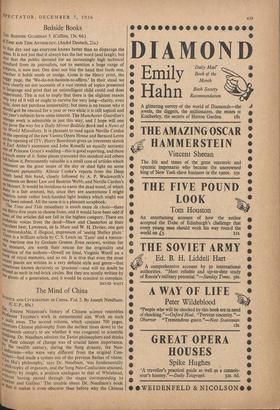Bedside Books
1p this day and age everyone knows better than to disparage the Press. It is not just that it always has the last word (and laugh), but also that the public demand for an increasingly high technical standard from its journalists, not to mention a huge range of subjects, is now met. One does not bite the hand that feeds one, Whether it holds mush or stodge. Gone is the bleary print, the c1g8Y page, the 'We-do-not-hesitate-to-affirm.' In their stead we have clearly set out accounts of a vast stretch of topics presented In language and print that an unintelligent child could and does Understand. This is not to imply that there is the slightest reason why any of it will or ought to survive for very long—clarity, even style, does not purchase immortality; but there is no reason why it should cot be rescued for a year or two while it is still topical and last Year's subjects have some interest. The Manchester Guardian's Salvage work is admirable in just this way, and I hope will one aY have the way for a Daily Mirror Bedside Book and a News of World Miscellany. It is pleasant to read again Neville Cardus °I) the opening of the new Vienna Opera House and Bernard Levin °I) the opening of ITV; Harry Boardman gives an irreverent sketch dt Earl Attlee's ascension and John Rosselli an equally sarcastic ?Ile of Princess Grace's wedding—this is good reporting, and there Much more of it. Some pieces transcend this standard and others tall below it. Permanently valuable is a small core of articles which ie°nament on the great issues of the day or shed light on sonic South personality. Alistair Cooke's reports from the Deep comments head this band, closely followed by A. P. Wadsworth's „°1Thrlents on Bonar Law and Beatrice Webb, and Neville Cardus's there Mozart. It would be invidious to name the dead wood, of which "ere is a fair amount, but, since they are anonymous I might mention some rather keck-handed light leaders which might not have been missed. All the same it is a pleasant scrapbook. the Time and 7'ide miscellany is much more de choix—there are thirty-five years to choose from, and it would have been odd if most of the articles did not fall in the highest category. There are authentic voices from the dead—Shaw and Chesterton at their truculent best; Lawrence, de la Mare and W. H. Davies; one gets 1,11, unmistak.able, if illogical, impression of 'seeing Shelley plain.' ;ere is a brilliant article by C. S. Lewis on 'Taste' and a memor- able wartime one by Graham Greene. Even reviews, written for llc moment, are worth their rescue for the originality and birunence of the authors—Orwell on Joad, Virginia Woolf on a r°k of royal memoirs, and so on. It is true that even the most sometimes pieces are written in a very definite style and genre—that
abused known derisively as 'gracious'—and will no doubt be the as such in red-brick circles. But they are mostly written by
ue Ziants of a generation, and it would be criminal to complain.
DAVID WATT


































 Previous page
Previous page